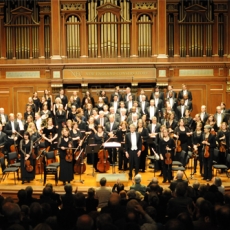Boston Baroque - Haydn Creation - Classics Today
Artistic Quality: 9
Sound Quality: 10
Some people just aren't fans of the grandiose, temporally elongated, performer-heavy choral works that perennially seem to draw equally grand, populous audiences to the world's large-scale concert venues. We (okay, I include myself in this group) just prefer choral music in which every voice actually counts (Brahms Requiem and Orff Carmina Burana excepted), and where (Messiah and St Matthew Passion excepted) you don't need an hour and a half to hear one piece. (My colleague, Dave Hurwitz, insists that my real problem in these cases is that there's just too much excitement for me to handle. But I like the Byrd four-part Mass and Mozart's Requiem-do they count?)
Truth be told, with Haydn's unquestioned masterpiece The Creation, the issue is not its length or how big the orchestra is: rather, it's the incessant obsession with musical scene- and word-painting, a nice trick that shows just how skilled and clever a composer can be-or how pedestrian, derivative, or mundane. And indeed, Haydn isn't just clever at this: he's a genius. He employs the orchestra's ability to depict chaos or light or rain or lions and tigers and worms, or thunder in ways that no one before had ever conceived. You can listen to sections such as the famous opening "Representation of Chaos" and believe you are hearing Beethoven before Beethoven became Beethoven. Okay, fine.
A big question is, is this really an oratorio, or something else? In many places it seems more like an opera-and indeed, with just a little more imagination (especially on the librettist's part) this could have been turned into a sort of Midsummer Night's Dream-like theatrical piece, given the characters (adding a couple of comic-relief types) and possible scenarios. What more dramatically ripe atmosphere than the wild, newly formed world? What more magical setting than the Garden of Eden? But instead we get merely a magnificent, masterful display of orchestral eloquence, dramatic capabilities, and thematic invention and development, superb choral writing, and, although too numerous for my taste, reams of recitative, skilfully written and sometimes powerful and moving.
And Martin Pearlman, who's been doing these sorts of productions with his period-instrument Boston Baroque for several decades, manages to capture the essential majesty and inherent expressive/dramatic character of the music and textual material with what many would consider relatively modest forces-less than Haydn's largest configuration, but more than the composer utilized for other occasions. His secret weapon here-not his choral and orchestral musicians, who already are widely-, well-regarded experts in this repertoire-is the recording venue, the coveted acoustics of Mechanics Hall in Worcester, Massachusetts. You can hear everything, and all of it, from orchestral tuttis to solo/orchestral passages to sections with chorus, soloists, and orchestra, is clear and well-balanced.
My only reservation-this is a big work with lots of parts, and there's bound to be something-concerns the soloists. They are confident and competent, no question. And bass-baritone Kevin Deas probably delivers the best portrayal of the creeping, sinuous worm on disc-that final low D-flat is amazing! But each of these soloists possesses a consistent and distracting vibrato (tenor Keith Jameson also has a kind of sinusial timbre)-too slow in the case of Deas and Jameson, too fast in the case of Forsythe. To my ears this sort of thing is noticeable but ultimately surmountable: after all these singers are very accomplished and technically/stylistically competent and informed. But it must be mentioned because some listeners will be a bit, temporarily, distracted, while others will wonder what the fuss is about. There's no fuss-just one of those singer-preference things. You know what I mean.
Fans or newcomers to The Creation should be happy with this-forget whatever bias you may have toward period or modern interpretations. This orchestra conveys Haydn's colorful score as well as any, and this chorus is second to none for its unbridled energy and uncommonly articulate delivery. Too much excitement? Go ahead, if you dare!

